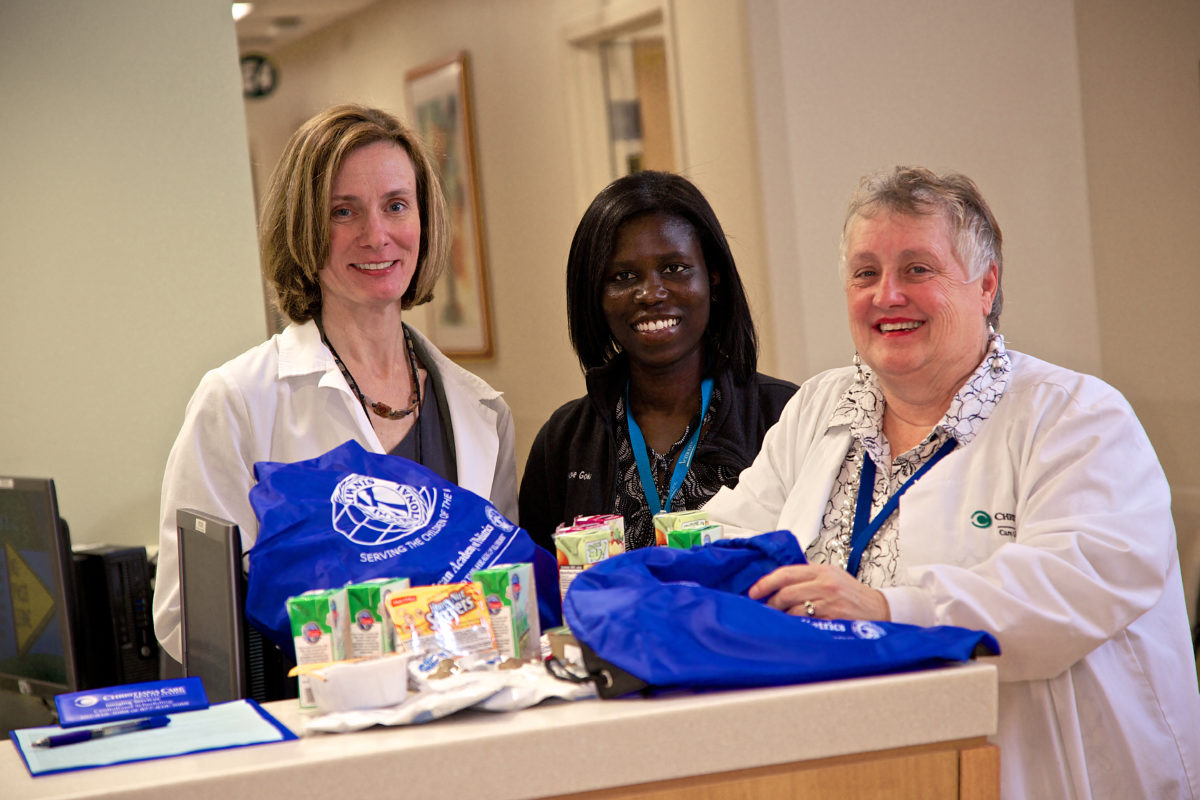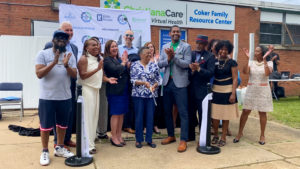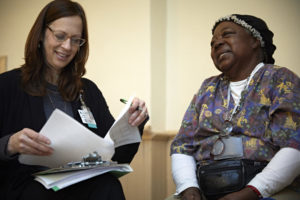Parents and children visiting the Pediatric Practice Program at Wilmington Hospital over the past year have received assistance in overcoming food insecurity, including emergency food provided through a partnership among Christiana Care, the Food Bank of Delaware and Kiwanis Club of Wilmington.
Recognizing that parents do not always have access to adequate food, which can result in the lack of proper nutrition for children and adults, the pediatric staff of the Rocco A. Abessinio Family Wilmington Health Center devised this program, called “Reach Out and Feed.” It aligns with policy recommendations by the American Academy of Pediatrics, which has called for pediatricians across the nation to address the food security issue by screening children to identify vulnerable patient families and connect them with community resources.
“By coordinating with community resources, we strengthen our ability to place our patients and their families on the path to wellness,” said Christiana Care Chief Health Equity Officer Bettina Tweardy Riveros. “The food security program is an innovative example of coordination across organizations that are committed to serving our community and that have identified resources to address a pressing need — hunger — that is foundational to helping patients achieve optimal health.”
Children who live in households that are food insecure get sick more often, recover more slowly from illness, have poorer overall health and are hospitalized more frequently, according to the American Academy of Pediatrics, which estimates that close to 16 million U.S. children are struggling with hunger.
“Food insecurity is a huge concern in the city of Wilmington, where there is a high percentage of low-income families,” said Christiana Care’s Jennifer M. LeComte, D.O., FACP, FAAP, medical director, Transitions and Pediatric Practice. “I am concerned because poor nutrition can have a lifelong impact on health, affecting everything from bone density to heart health and cognitive development.” She is pleased that pediatricians at the Wilmington Health Center now have a way to open a conversation about food with families.
During pediatric appointments parents are asked two important questions:
- Within the past 12 months, did you worry whether your food would run out before you got money to buy more?
- Within the past 12 months, did the food you buy just not last and did you not have money to get more?
Parents answering yes to either question are offered an “emergency food backpack” filled with nutritious and kid-friendly foods. The backpacks are provided by the Food Bank of Delaware and are funded by a grant from a local chapter of Kiwanis International. Backpack food items include shelf-stable milk and juice, as well as granola bars, applesauce, cereal and three full meals. Parents are also provided with a list of local food pantries to meet future needs.
Families face all sorts of issues when it comes to being able to obtain the right balance of foods, said Amanda J. Kay, M.D., MPH, FAAP, a board-certified pediatrician with Wilmington’s Pediatric Practice Program. She recalls working with a family in which she recommended a mother switch from whole milk to skim milk to reduce calorie intake for an obese child. But the mother said she could only buy whole milk in her small neighborhood grocery.
“Of course, we never want to judge — food insecurity can happen to anyone,” said Dr. Kay. “I have had families with children who were hungry in the offi ce, and they needed to open the food packs right away. When a family faces food insecurity, we provide a backpack for every child in the home. As a provider, I’ve learned it’s important to know what resources can help our families.”
Often Wilmington Health Center pediatricians assist families leaving emergency shelters, helping parents learn about food pantries and other services. And for parents who would like further aid, social workers meet with them before they leave the pediatric practice. Social workers can make sure patients are taking advantage of federal nutrition programs such as the Special Supplemental Nutrition Program for Women, Infants and Children (WIC), the Supplemental Nutrition Assistance Program (SNAP), as well as school lunch and breakfast programs.
“Many of our families don’t know how far their money will stretch, and that causes a lot of stress,” said Linda Brennan-Jones, BS, BALS, outpatient social worker. “What I see is that through our pediatric outreach we can impact the whole family — psychologically and nutritionally.”
Drs. LeComte and Kay hope to expand the food program to include another round of backpack grants, more nutritional education and more access to fresh fruits and vegetables for patients.
“I have high hopes that we can build on our success and continue to make a difference in the lives of our families,” Dr. LeComte said.



